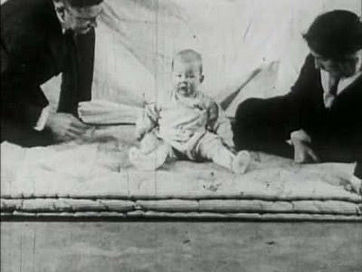Ethics and Morality
Behave!
Fictional biographies of famous scientists can educate as well as entertain.
Posted July 27, 2016

John B Watson and Rosalie Rayner with Little Albert
Well-written biographies are often fascinating, but sometimes they are too detail-rich for many readers. In recent years a new “genre” has become popular: the fictional biography. This is a novel based on facts. The authors of these novels have a difficult task in balancing fact and fiction, and some do it better than others. The other trend that has become popular is to write these fictional biographies from the point of view of the wife or mistress of the famous man, a point of view that has probably been neglected before, and is therefore new material for an avid reading audience. These novels often have in common the theme of the highly intelligent young woman who, after marriage to the famous man (usually before he is famous), becomes subsumed by him, and the relationship changes from one of passion to one of disappointment at best, and horror at worst. For me, two of the factors that make a novel in this genre believable, is that it is informed by known facts about the main ‘characters’ and doesn’t stray too far from those facts, and that the science, art, technology, or skills that made the man famous is well understood by the author and woven in a natural way throughout the narrative.
On the more factual end of the book spectrum, are books about famous people or scientists or the people who have been the participants (the “subjects”) in scientific experiments. These are based on fact and the authors have usually carried out exhaustive research before turning that fragmented research into a story that reads like fiction, and engages the reader in the inner lives of these real people. But even in these factual accounts, the views of what went on are through the lens of the writer, and are unlikely to be able to tell an entirely rounded and fair view. Of course, only readers who themselves have either appeared in the story or have known the ‘characters’ and been at the ‘events’ might know that the whole truth is not here.
One of the most interesting aspects of all these books is that of ethics; scientific and medical ethics usually, at least in the books I have read lately. For a scientist to be called or thought unethical is the ultimate insult. The scientists in these books are usually long dead and can’t defend their honor. Perhaps they couldn’t of course, because they were unethical, even when their behavior is viewed within the context of their time.
In the next few posts I am going to take one book that portrays psychologists. or in some cases other scientists, either a novel, or a ‘biography’ that reads like a novel, and give my view on how well the writer manages these fiction/fact/ethics issues. Hopefully this will encourage you to read some of those books for yourself. There is no easier and more pleasurable way to learn a great deal about science and psychology and ethics and the history of all three than by reading the sort of book you can take to bed or read on the beach!
My first choice, Behave, by Andromeda Romano-Lax. Here’s how the Goodreads description of the book begins.
“…a lush, harrowing novel based on the real life story of Rosalie Rayner Watson, one of the most controversial scientists—and mothers—of the 20th century
"The mother begins to destroy the child the moment it’s born,” wrote the founder of behaviorist psychology, John B. Watson, whose 1928 parenting guide was revered as the child-rearing bible. For their dangerous and “mawkish” impulses to kiss and hug their child, “most mothers should be indicted for psychological murder."
Behave is the story of Rosalie Rayner, Watson’s ambitious young wife and the mother of two of his children.”
Every psychology student has read (or been lectured about) the story of Little Albert, the nine-month old baby that American psychologist , John Watson, the ‘father’ of radical behaviorism, and his then assistant, Rosalie Rayner, used in a way we find as horrific now, to demonstrate that babies are not born afraid of nasty things like white rats and snakes, but are conditioned to fear them. A loud sudden noise startles a baby just as it startles an adult, and only when the rat was paired many times with a loud sudden noise did little Albert begin to associate the two stimuli. Once conditioned, then the rat by itself would frighten him. Unfortunately, Albert was taken away from the institution where Watson got all his “subjects” (babies only a day or two old in some cases) before they could decondition him. No-one knows what happened to Albert, although there have been some hints that his brain, even before they began their experiments, was not normal, and that he had hydrocephaly (expanded ventricles and probably a low IQ). Thus this experiment was not in fact very scientifically useful in telling us about people with normal brains.
I found this novel a page turner. Set in the 1920s and ‘30s, Behave satisfied my expectations of a well-balanced fictional biography; it really did stick pretty much to the facts when it came to ethical and scientific and character issues, and the psychology was woven elegantly with the story of the couple. The affair of the twenty-year-younger Rosalie Rayner with her advisor and boss, John Watson (in this case already with his confident feet firmly on the rungs of the academic ladder) was controversial at the time, and broke up his first marriage.
Rayner certainly was to some extent subsumed by Watson following their marriage and the birth of their two sons, but not entirely, and she co-authored a popular book on parenting with Watson which was largely based on the upbringing of their own two sons. In this fictionalized account Rosalie struggled with the strict requirements of behaviorism (no kissing and cuddling of children) and did to a small extent manage to bring some small changes into their childrearing practices (a quick cuddle or kiss when Watson wasn’t there!). If she hadn’t died suddenly at 35 of dysentery it seems likely that she would have gone on to a career herself, perhaps in advertising like her husband (who after being sacked from academia following their affair, did even better in advertising, where he could put into practice his radical behaviorism with less damage than these theories wrought on a generation of child-rearing practices.)
The skill of the author of Behave was in rendering the two main players empathetic in spite of their behaviors. Watson never remarried, and became almost a recluse in later years. He seemed able to change his radical views somewhat as new evidence emerged, and of course some of his findings remain valid today. Their two sons and his daughter by his first wife had troubled lives, one of the sons committing suicide and the other attempting it, and there is some evidence that they put their depression down to the way they were brought up. A sad lesson for those scientists who experiment on humans in an uncontrolled and unvalidated way, and especially on their own children (although this does show that Watson, who appeared to love his sons, truly believed that what he was doing was valid and not harmful).
So if you want an engaging read which will not only entertain you but also teach you a great deal about these giants in the history of psychology, and the ethics of those times which we now see as abhorrent, I recommend Behave!
In my post next month I will give you my thoughts on a very new nonfiction book to be published in August, on the fascinating and well-researched story about Patient HM, and the scientists who studied him, and even more fascinating of the neurosurgeon who performed the unethical operation that stole HM’s memory. A twist is that the author, Luke Dittrich, is not only a journalist, and therefore understands about researching an article (or book) but is also the grandson of that neurosurgeon. So his book is a sort of memoir as well as a biography, and his descriptions of the barbaric psychiatric treatments still used in America in the first half of the 20th century will prove to you that fact can indeed be stranger than fiction. Then in September, I’ll introduce you to another fictional biography told by the wife of a famous scientist. Unlike Behave, this book strays way too far from facts, and in doing so denigrates and destroys the character of this very famous and revered man.
Please subscribe to my monthly e-newsletter!




